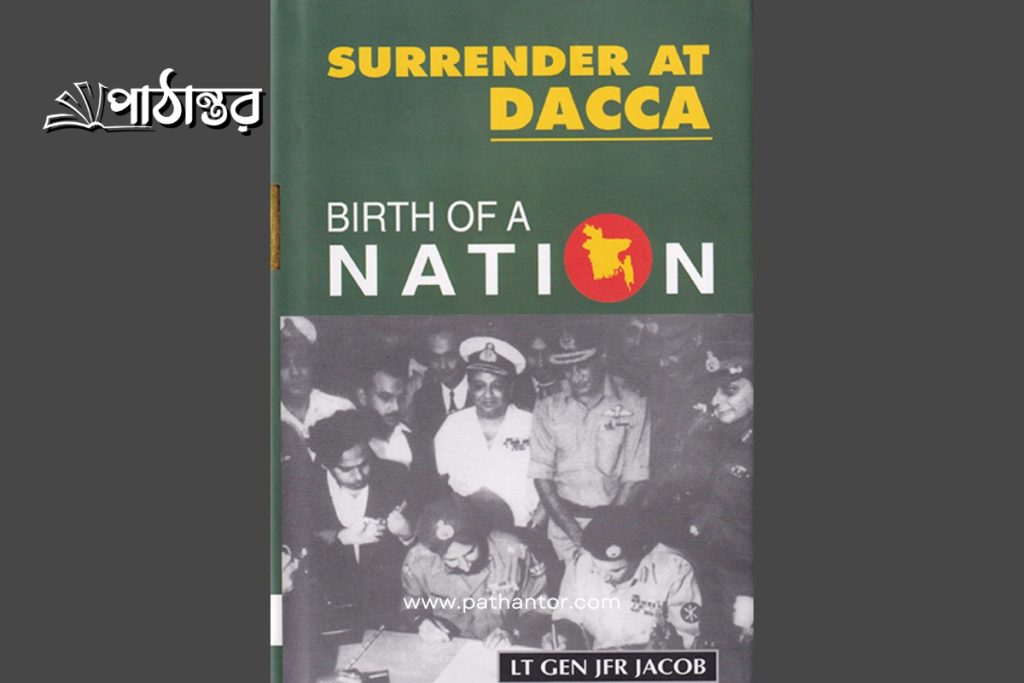Introduction: In “Surrender at Dacca: Birth of a Nation,” Lieutenant General J.F.R. Jacob meticulously chronicles the events leading to the historic surrender at Dacca on December 16, 1971, which marked the birth of Bangladesh. This book provides an in-depth analysis of the military strategies and decisions that shaped one of the most significant moments in South Asian history.
The Prelude to Surrender: The surrender at Dacca was not just a military defeat for Pakistan; it was the culmination of a series of miscalculations and the unyielding spirit of the Bengali people. General Jacob, who was the Chief of Staff of the Indian Eastern Command, played a pivotal role in the planning and execution of Operation X, which led to the liberation of East Pakistan.
Operation X: The book delves into the details of Operation X, the code name for the Indian military campaign in East Pakistan. General Jacob’s strategic brilliance and understanding of the ground realities were crucial in bringing about a swift and decisive victory. The operation was not just a showcase of military might but also of the humanitarian considerations that shaped the Indian Army’s approach.
The Surrender Document: One of the most riveting sections of the book is the account of the drafting of the surrender document. General Jacob’s insistence on a complete and unconditional surrender, despite resistance from the Pakistani side, was a turning point in the negotiation process. His narrative provides readers with a rare glimpse into the behind-the-scenes dynamics that led to the signing of the document by Lieutenant General A.A.K. Niazi.
Legacy of the Liberation War: The impact of the 1971 Liberation War on the region and the world was profound. General Jacob’s account does not just stop at the military aspects; it explores the broader implications of the war on the geopolitical landscape. The birth of Bangladesh reshaped South Asia and set a precedent for future conflicts and resolutions in the Third World.
Personal Reflections: General Jacob’s personal reflections add a unique dimension to the book. His deep connection with the events, his respect for the Bengali struggle, and his commitment to ethical warfare are evident throughout the narrative. These reflections provide readers with an understanding of the human side of military leadership during times of conflict.
Conclusion: “Surrender at Dacca: Birth of a Nation” is not just a historical account; it is a tribute to the courage and resilience of those who fought for Bangladesh’s independence. General J.F.R. Jacob’s detailed and compelling narrative ensures that this book remains a crucial resource for anyone interested in understanding the complexities of the 1971 war and the creation of a new nation.
The Strategic Genius of General Jacob In this section, General Jacob’s military acumen is highlighted, showcasing his ability to adapt to the rapidly changing dynamics of the battlefield. His strategic decisions were instrumental in the success of Operation X, proving that leadership in war requires not just tactical knowledge but also foresight and empathy.
Operation X: A Masterclass in Military Strategy A closer look at the execution of Operation X, detailing how General Jacob’s planning and the coordination between various divisions of the Indian Army led to a swift and decisive victory. The operation is analyzed as a case study in effective military strategy.
The Humanitarian Side of War While war is often associated with destruction, General Jacob’s approach to the 1971 conflict was also shaped by a deep concern for minimizing civilian casualties. This section explores the ethical considerations that influenced the Indian Army’s operations during the war.

